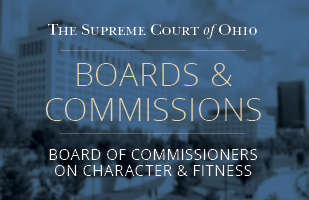Character and Fitness: Review, Reinforce Reputation

The 12-member board that’s represented from each appellate district ensures applicants possess the requisite moral qualifications to practice as an attorney.

The 12-member board that’s represented from each appellate district ensures applicants possess the requisite moral qualifications to practice as an attorney.
Editor’s Note: This story is part of a series on the Ohio Supreme Court’s boards and commissions.
Many jobs require a background check. Investigations of prospective Ohio attorneys are based on answers they provide and information gathered by the National Board of Bar Examiners.
The group in Ohio responsible for granting clearance is the Board of Commissioners on Character and Fitness.
The 12-member board includes an attorney from each of the state’s appellate districts. It ensures applicants possess the requisite moral qualifications to practice as an attorney.
This evaluation takes place before they can prove their professional competence through the Ohio Bar Examination.
“It’s some of the most rewarding work these board members ever do. They don’t get a lot of recognition because the process is confidential,” said Gina Palmer, the Ohio Supreme Court’s director of the Office of Bar Admissions and Attorney Services.
In essence, the review process determines the requisite character, fitness, and moral qualifications of each applicant.
Crimes, including high-level felonies, do not automatically disqualify a person’s pursuit of becoming a lawyer. The board’s emphasis on character and fitness stresses an individual’s current standing.
However, serious offenses require more investigation and scrutiny to determine whether an aspiring lawyer has been rehabilitated.
A common concern is how a person behaves during the probe, which lasts an average of four to eight months and can be extended to two years if there are multiple investigations and appeals.
“It’s not always the deed itself that gets you pulled,” Palmer said. Instead, she said, it’s the failure to disclose information or “lying, or mischaracterizing.”
The application process starts by registering in the second year of law school with the Office of Bar Admissions. That material is forwarded to the National Conference of Bar Examiners, which compiles a thorough report verifying background information, contacting references and conducting police checks.
Once complete, those details are sent to the admissions committee of a local bar association, where at least two committee members interview the applicant. After the interview, and possibly further investigation, the committee offers its recommendation to the character and fitness board.
If an aspirant is not granted unconditional approval by the local bar, the person can appeal to the board.
If an applicant receives local bar approval but the board is not satisfied that they have shown the proper character and fitness — or if the board wants information — the board will further examine the applicant’s qualifications.
Like the Board of Professional Conduct, three members of the character and fitness board will hear testimony and arguments presented by the applicant and the local bar association’s committee. A report of the hearing — and any additional investigation — is presented at a meeting and voted on by the full board.
“For attorneys, who are used to advocating, that’s a pretty cool thing to sit on the bench and hear cases,” said Palmer. “It’s an important thing. It keeps the integrity of the entire profession.”
If denied final approval by the board, the applicant is entitled to an oral argument before the Supreme Court. The justices then make the final decision on whether the prospect is deemed fit.
Red flags beyond criminal offenses could also include untreated substance use disorders, academic misconduct or neglecting to pay debts.
“If you can’t manage your own finances, how can you be trusted to manage others?” Palmer asked.
Along with approving first-time lawyers, the board also handles applications from out-of-state attorneys seeking an Ohio license.
As part of the process to ensure good standing, the board will examine whether there have been complaints of misconduct, malpractice, issues with fulfilling continuing legal education requirements, multiple firings, and even scrutinize excessive traffic tickets that can question “an applicant’s respect for the law.”
Board members are appointed by the Supreme Court for three-year terms, which they can retain for three cycles.
Service on the Board of Commissioners on Character and Fitness is one of the many ways an attorney can give back to the profession. The Board of Commissioners on Character and Fitness, like other boards and commissions, has a need for volunteers to share in maintaining the integrity of the profession. The justices of the Ohio Supreme Court appoint the members of the board and are always grateful for applications from those willing to serve.


